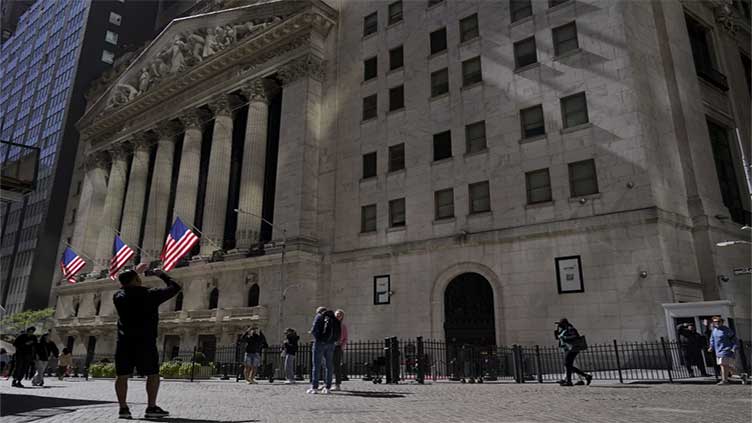Wall Street dips following profit reports, and oil prices jump on war worries

Business
Wall Street dips following profit reports, and oil prices jump on war worries
NEW YORK (AP) — Wall Street is dipping Wednesday following a mixed set of profit reports from big U.S. companies. Worries about war in the Middle East are also dragging on the market.
The S&P 500 was 0.6% lower in early trading. The Dow Jones Industrial Average was down 110 points, or 0.3%,, as of 9:45 a.m. Eastern time, and the Nasdaq composite was 0.8% lower.
Crude oil prices jumped sharply overnight following a deadly explosion at a hospital in the Gaza Strip, which sparked protests across the Middle East. But oil prices pared their gains as the morning progressed. Gold, meanwhile, kept rising as investors have looked for safer investments since the Oct. 7 surprise attack on Israel by Hamas.
On Wall Street, United Airlines slumped 7.5% after it showed how big a hit to profits it may take because of surging fuel prices and the suspension of flights to Tel Aviv. It gave a profit forecast for the last three months of the year that fell well short of analysts’ expectations.
The forecast overshadowed United’s reporting a bigger profit for the summer than Wall Street had forecast. Other airlines fell in concert, with American Airlines down 4.7% and Delta Air Lines down 4.1%.
Morgan Stanley also tumbled, down 5.9%, even though it likewise reported a bigger profit for the latest quarter than analysts expected. Investors focused on a weaker-than-expected showing by the company’s wealth management business, analysts said.
On the winning side of Wall Street was Procter & Gamble, the giant behind such brands as Charmin, Febreze and Oral-B. It rose 3% after reporting stronger profit than expected for the latest quarter. Its revenue rose after it increased prices for its products.
Elevance Health climbed 2.5% after it reported stronger earnings than expected for the third quarter and raised its profit forecast for the full year.
The earnings reporting season for the summer is still in its early days, and the broad expectation is for S&P 500 companies to say their overall earnings per share rose last quarter for the first time in a year.
Such growth in profits are essential for the stock market to keep rising, particularly when the other big factor that drives stock prices is pushing the other way.
Treasury yields in the bond market have been on a steady march higher as investors accept a new normal where the Federal Reserve is likely to keep interest rates high to get inflation under control. High rates and yields hurt prices for stocks and other investments.
The yield on the 10-year Treasury ticked up to 4.85% from 4.84% late Tuesday and from less than 3.50% during the summer.
In the oil market, a barrel of U.S. crude approached $90 before paring its gain. It was up 1.9% at $87.09 per barrel. Brent crude, the international standard, was 1.3% higher at $91.04 after earlier nearing $93 per barrel.
The spark for the jump was a blast at a Gaza hospital that reportedly killed hundreds. Hamas blamed it on an Israeli airstrike, while the Israeli military blamed a rocket misfired by members of another Palestinian militant group. President Joe Biden seemed to suggest it wasn’t Israel.
The fear in financial markets is that the latest Hamas-Israel war will draw in big oil-producing nations, such as Iran, and lead to disruptions of supply.
Iranian Foreign Minister Hossein Amirabdollahian called on Muslim nations Wednesday to expel their Israeli ambassadors and launch an oil embargo on Israel after the explosion at the hospital.
Gold rose 1.6% to $1,967 per ounce as investors looked for things that looked safer to own.
In stock markets abroad, indexes were lower in much of Europe after ending mixed in Asia.
China reported Wednesday that its economy grew at a 4.9% annual pace in July-September, down from 6.3% in the previous quarter. The National Bureau of Statistics said the world’s second-largest economy slowed in the summer as global demand for exports faltered and the ailing property sector sank deeper into crisis.


